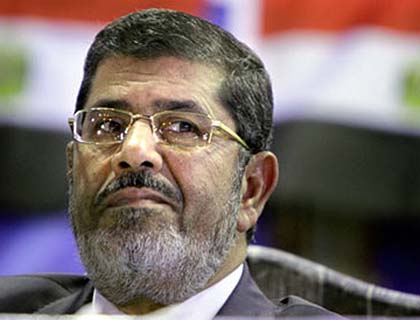It has been a matter of just days that, perhaps, Egyptians breathe in relief as after long bone-crunching motion of political processes, Mohammad Mursi, the candidate of Muslim brotherhood announced as ultimate winner of recent presidential election. He was not a well-known member of Muslim Brotherhood before the start of presidential election campaign and stepped only after the first nominee of the party was disqualified by election committee. He competed with his potential rival, Mr. Ahmad Shafiq, the former Prime Minister and ex-military chief, in the run-off and defeated him.
However both, Ahmad Shafiq and Mursi, before the announcement of the result, announced themselves as winner but finally it appeared that Mohammad Mursi could defeat his only rival but not with large difference. In spite of fear and anxiety of new round of protest and uprising after the announcement, Tahrir Square, the center of civil uprising, remained quiet, and Ahmad Shafiq accepted his defeat and Mohammad Mursi became the first president during more than seventy years old history of Brotherhood's political activities.
The question is; is Mr. Mursi the true heir of Egyptian protestors? Did those who were spending nights in Tahrir Square, chanting slogans against the Hosni Mobarak regime and asking for political reforms, imagined that it would finally be Islamic political parties to replace the regime of Hosni Mobarak?
Though the presence of Brotherhood's supporter cannot be rejected in months of continuous civil unrest, generally Tahrir protestors were those who wanted democracy and economic prosperity, not supporters of Islamist and radical groups. Some analysts maintained that movement was largely end to fruit by middle class youngsters who are equipped with modern technologies, particularly internet and social networks.
It is widely believed that Arab youngsters are not comparing their lives with the condition of their forefathers anymore, instead doing with those who enjoy democracy in developed countries. In this process the technological revolution played quite important role.
The civil uprising is not limited to borders of Egypt. People around the world where they lack democratic establishment have created headache for their rulers to loosen their grasp over their freedom and liberty. These new generations generally support open society with plural characteristic no matter what their religious and cultural believes are.
Whoever gains their trust and ensure them of protecting their rights and ruling on the basis of law can attract them. Therefore, politicians around the world have been trying most to build a friendly relation with youngsters. Everyone tries to ensure that they have specific programs and policies regarding the new generation. See for example the current political rivalries in Afghanistan.
Oppositions blame government officials that they are trying to ruin the freedom and liberty achieved during past eleven years of international community's involvement. And there is a current Youth Jirga where more than thousands youngsters have come together and discuss the issue of peace talks with Taliban militants.
Political parties have also been trying to penetrate among school, university and other educational institutions through giving mouthwatering slogans for job creation and protection of their rights and freedom. These efforts show that everywhere politicians and political parties count much on the potential of youngster to get them reach their objectives and enforce their goals.
Even the countries which have the label of authoritarianism also emphasize on the essential rights of youths to be protected and their freedom must be ensured. In the neighboring country, Iran, theocratic regime also openly brands itself as supporters of youngsters and their freedom and liberty.
In brief, the supporters of democracy and individuals freedom have increase to a level that rulers have no choice ahead other than hiding their mentality and talk according to the principles of modern values.
However, it should be noticed that there is another category of youngsters who are targeted by radical groups. But this is the category that certainly played least role in toppling of the regime of Hosni Mobarak. Because all those who made sacrifices and mounted pressure on the former regime were not asking for establishment of a Shariah-based government. Demonstrators were asking for democracy, employment and economic wellbeing.
So, no doubt, the first category played major, if not the only, role in toppling Mobarak's regime. But seemingly, those who fuelled the machine of revolution now are marginalized and play no critical role in the power structure. Instead those who could exploit the situation who remained calm but had a consistent presence in Egyptian society, as the recent presidential election showcased.
There is no one who could represent the layer which caused the Mobarak to step down. Ahamd Shafiq and Mohammad Mursi none could represent them. As many were saying after the announcement of first round presidential election result that there was no choice for Egyptians.
On one hand, there was Ahmad Shafiq, survival of the regime that people made huge sacrifices to uproot, and on the other hand, Mohammad Mursi was an Islamist which could threaten the relative secular establishment. Thus, none had a particular status among the so-called generation of face book and other social networking sites.
Muslim Brotherhood during its long history has been trying to establish an Islamic government or make the rulers to follow Shariah laws, but they failed. The recent revolution was the task of the party but its leaders could use the situation quite well. In both parliamentary and presidential elections, nominees of the party could easily defeat their competitors and gain the power.
It showed that its leadership could build a close relation with the bulk of common people and attract their attention for establishment of a type of Islamic government. Thus, it can be claimed with certainty that Muslim Brotherhood earned much from the fruits of revolution brought about by others' efforts.

